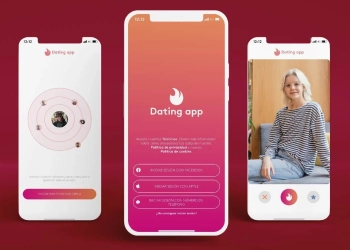With the beginning of social media and the prevalence of online dating sites, it is becoming increasingly common for people to form relationships with someone they have never met in person. But are online relationships real? Can two people who communicate solely over the internet truly connect on a deeper level and develop a meaningful bond?
Let’s take a closer look at what constitutes a real relationship, regardless of whether it’s formed online or offline.
Defining “Real” Relationships
The question of whether online relationships can be considered “real” is subjective. Everyone has their own definition of what makes a relationship “real,” which is why there are no definitive answers to this question.
That being said, there are some general characteristics that all real relationships share, and these qualities can be achieved through both online and offline communication.

For example, many people believe that an intimate connection is essential for any real relationship to form. This connection can be established through meaningful conversations that go beyond the surface topics, such as talking about your dreams and aspirations or sharing stories about your life experiences.
In terms of online communication, this may take place in the form of text messages, emails, or even video calls allowing you to get to understand each other on a more profound level than if you simply had small talk.
Trust is another key component of a real relationship. When two people trust each other unconditionally and rely on one another for support and encouragement, then they have crossed into true friendship territory.
In order for trust to develop in an online setting, it’s important for both parties to be open and honest with each other and practice consistent communication over time.
Commitment is also an important factor when determining whether an online relationship can be considered real or not.
If two people make an effort to stay connected with each other despite any obstacles that come their way, such as distance, then this shows commitment on both sides. These efforts can help create long-lasting bonds between individuals, even if they’ve never met in person before.
What Makes an Online Relationship Different?
The main difference between online and in-person relationships is the lack of physical contact. When you’re in an online relationship, you don’t get to experience things like hugs or holding hands.
You also don’t get the same nonverbal cues from your partners, such as facial expressions or body language. The lack of physical contact can make it harder for two people to build trust and develop intimacy.
However, there are certain advantages to having an online relationship as well. For example, you have more time to think about and express your thoughts and feelings without worrying about being judged by your partner or others around you.

You can also be more open and honest with your partner since you don’t have to worry about saying something wrong or embarrassing yourself in front of them. Plus, if you live far away from each other, an online relationship allows you to stay connected without having to constantly travel back and forth.
The Benefits of Online Relationships
Online relationships can provide us with invaluable support when we need it most, whether it is from our friends or family members whom we don’t get to see very often due to distance or other circumstances.
They also give us a platform for exploring our identities, developing empathy for others, and learning more about different cultures and backgrounds than our own.
Additionally, spending time chatting with someone who shares similar interests or hobbies can help us feel less alone when going through tough times.
By establishing trust through open communication and demonstrating commitment towards each other over time, individuals can build strong friendships even if they have never actually met face-to-face before.
Are Online Relationships Just as Real?
At the end of the day, it really depends on your definition of a real relationship. Some people might argue that since there isn’t any physical contact involved, then an online relationship isn’t real enough for them.

While others might argue that if two people share emotional connections with each other and communicate regularly, then their relationship is just as real as any other type of relationship out there.
Ultimately it all comes down to understanding what makes up a real relationship regardless of how it was formed so that everyone involved knows exactly what they’re getting themselves into.
The Differences between Online and Offline Relationships
The main difference between an online relationship and one formed in person is that you don’t get to experience physical contact or closeness.
This means that there are certain feelings and experiences that cannot be fully expressed over the internet, such as a hug or holding hands. Additionally, many people find it difficult to express their emotions via text or video call, making it hard to truly know how someone is feeling.
Despite these differences, however, there are several aspects of an online relationship that can make them just as strong as offline ones. For instance, many people find it easier to open up about themselves when they communicate through writing rather than face-to-face conversations.

This means that online relationships can give us the opportunity to form deep emotional connections with others without feeling uncomfortable or vulnerable. Furthermore, we can form long-lasting friendships with people from all around the world who we would otherwise never have met in real life.
The Bottom Line
In conclusion, while there is no standard answer as to whether online relationships can be considered “real” or not, there are certainly ways in which two people can create meaningful connections with one another over the internet, regardless of how far apart they may physically be from each other at that moment in time.
Whatever your opinion may be, it’s hard to deny that online relationships have become increasingly popular over the past few years. Moreover, they show no signs of slowing down anytime soon.
Whether they can truly be considered “real” or not is ultimately up for debate, but one thing is for sure they provide us with a unique way to form meaningful connections with others despite our differences in location, background, and lifestyle.







